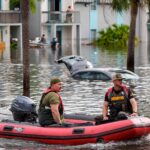Warren Heck, chairman and chief executive officer of Greater New York Mutual Insurance Company in New York, N.Y., brought his company’s front line experience with terrorism risk before a House Financial Services subcommittee that is weighing the future of the federal terrorism insurance program.
Heck spoke on behalf of the National Association of Mutual Insurance Companies, which supports an extension of the federal terrorism reinsurance backstop in the Terrorism Risk Insurance Act, with some modifications. His testimony covered a lot of territory, including what modifications to TRIA might work and the Treasury report on TRIA.
He also recommended that Congress consider adopting a reinsurance pooling mechanism similar to Pool Re in Great Britain.
Heck’s company has had years of experience with terrorism risk, being the fourth largest writer of commercial multi peril business in New York state and the fifth largest writer of that business in New Jersey.
Heck also serves as his company’s chief underwriting officer, enabling him to have first-hand knowledge and understanding of the needs of his policyholders and agents, particularly with respect to terrorism exposure.
“Without the passage of the Terrorism Risk Insurance Act, our company could not have kept its market open in the same way in New York City, and retained the insurance capacity needed to write new business and grow its direct written premium,” said Heck.
“The terrorism threat facing this nation post 9/11 remains real as our country continues under an elevated terrorism alert,” said Heck. “The fact remains that the United States government has made significant progress to strengthen our security but it cannot guarantee another terrorist attack will not occur,” he added.
Heck cited Federal Reserve Board Chairman Alan Greenspan’s recent testimony endorsing a government-backed reinsurance program for terrorism. Greenspan recently commented, “There is no way that the private insurance market can handle terrorism-related risk by itself because of the ‘very substantial’ potential scope of damage.”
Heck characterized the Treasury Department’s recommendations for changes in TRIA as being a reasonable starting point for short-term reforms. “We agree with Treasury’s assessment that ‘the immediate effect of the removal of the TRIA subsidy is likely to be less terrorism insurance written by insurers, higher prices and lower policyholder take-up.’
“Given the Madrid bombings of last year and the recent bombing events in London, including one devastatingly successful one, we think the failure of the Congress to extend a terrorism reinsurance backstop could be a very harmful impact on the U.S. economy if terrorists succeed in attacking the United States again,” stated Heck.
Heck tried to convince lawmakers that terorism risk is an issue for the economy and taxpayers across the country, not just in his state.
“If Treasury is correct in its assessment of the short-term effect of ending the program, then the economic cost to our country of another terrorist attack would undoubtedly be far greater if the program is ended instead of extended,” said Heck. “The cost of government reinsurance provided under TRIA would pale in comparison to the billions in aid that the government would inevitably disburse in the form of terrorism disaster relief. That would be a cost borne by not just the people where the attack occurred but by the taxpayers from Hawaii to New York, as well as from Alaska to Maine and all states in between.”
While he said that Treasury’s recommendations, which include higher deductibles, a higher trigger point before TRIA kicks in, and exclusion of certain coverage are a reasonable starting point, Heck shared additional observations:
* In establishing a new deductible level and a higher event trigger, one must recognize that, if they are set too high, the program will unfairly discriminate against the medium- to small-companies in favor of large companies.
* Terrorism insurance does not operate in a free market in the United States. The state regulators in New York, the state most likely to be a terror target, have prohibited companies from excluding coverage for terrorism. There is no similar regulation requiring the reinsurance market to provide protection to the direct market, leaving insurers in a Catch-22: Medium and small companies will face a difficult choice, leave the marketplace for terror target-area risks or face the prospect of a financial disaster that could result if they write coverage. Should companies choose to leave the market, then it would eliminate competition in the marketplace.
* Unless the terrorism insurance bill includes the ability to exclude coverage in all states in the same manner as TRIA, Congress must provide a meaningful backstop that does not discriminate among insurers. Otherwise, a market will never be created that is priced according to the true nature of the risk.
“NAMIC supports a public/private partnership as the key element of a long-term solution,” stated Heck. “Even if an insurer were able to diversify its risk exposure through modeling and get sufficient private reinsurance to cover the TRIA deductibles, the notion that the private market can protect itself through good modeling is flawed.”
Heck commented that absent a terrorism insurance program, “a $250 billion terrorist event, the high estimate by the Organization for Economic Co-operation and Development, would wipe out so much of the property/casualty insurance industry surplus for all lines, estimated at $350 billion in 2003, that it would be unable to meet its obligations to its other insureds for the many different coverages beyond terrorism insurance protected by that surplus.”
“I think it is more likely that the creation of a private/public partnership, as it exists in Great Britain with the Pool Reinsurance Company Limited, commonly known as Pool Re, can be a substantial part of the solution,” said Heck.
Heck described Pool Re as a mutual insurance company that is authorized only to write reinsurance relating to terrorism risk on commercial property insurance. It differs from normal insurers and reinsurers in that it reinsures its liabilities with the British government, to which it pays a reinsurance premium and from which it will recover claims that exceed its resources.
Heck suggests other components Congress might consider:
* Requiring that terrorism insurance cover acts by domestic groups as well as foreign terrorists.
* Requiring that insurance, cover attacks involving chemical, biological, radiological or nuclear (CBRN) weapons, perhaps through a direct government program.
* Now would also be a good time for the federal government to examine tax and accounting policies that NAMIC believes are major impediments to increasing the capacity of insurers and reinsurers to provide terrorism coverage.
* The flow of private sector capital to this industry is also inhibited by outdated state regulatory policies that often require regulatory approval of the prices insurers charge. Such controls have been lifted from almost every other area of the economy and should be lifted from the insurance industry as well.
Topics Catastrophe USA Carriers Legislation New York Reinsurance Market
Was this article valuable?
Here are more articles you may enjoy.


 Berkely Says It’s No Longer Pressured to Push for Rate ‘Across the Board’
Berkely Says It’s No Longer Pressured to Push for Rate ‘Across the Board’  GEICO Settles Call-Center Worker Suits for $940,000; Attorneys Get Half
GEICO Settles Call-Center Worker Suits for $940,000; Attorneys Get Half  Longtime Alabama Dentist Charged With Insurance Fraud in 2025 Office Explosion
Longtime Alabama Dentist Charged With Insurance Fraud in 2025 Office Explosion  Opportunity for Private Flood Insurers With Threat of Another NFIP Lapse
Opportunity for Private Flood Insurers With Threat of Another NFIP Lapse 

